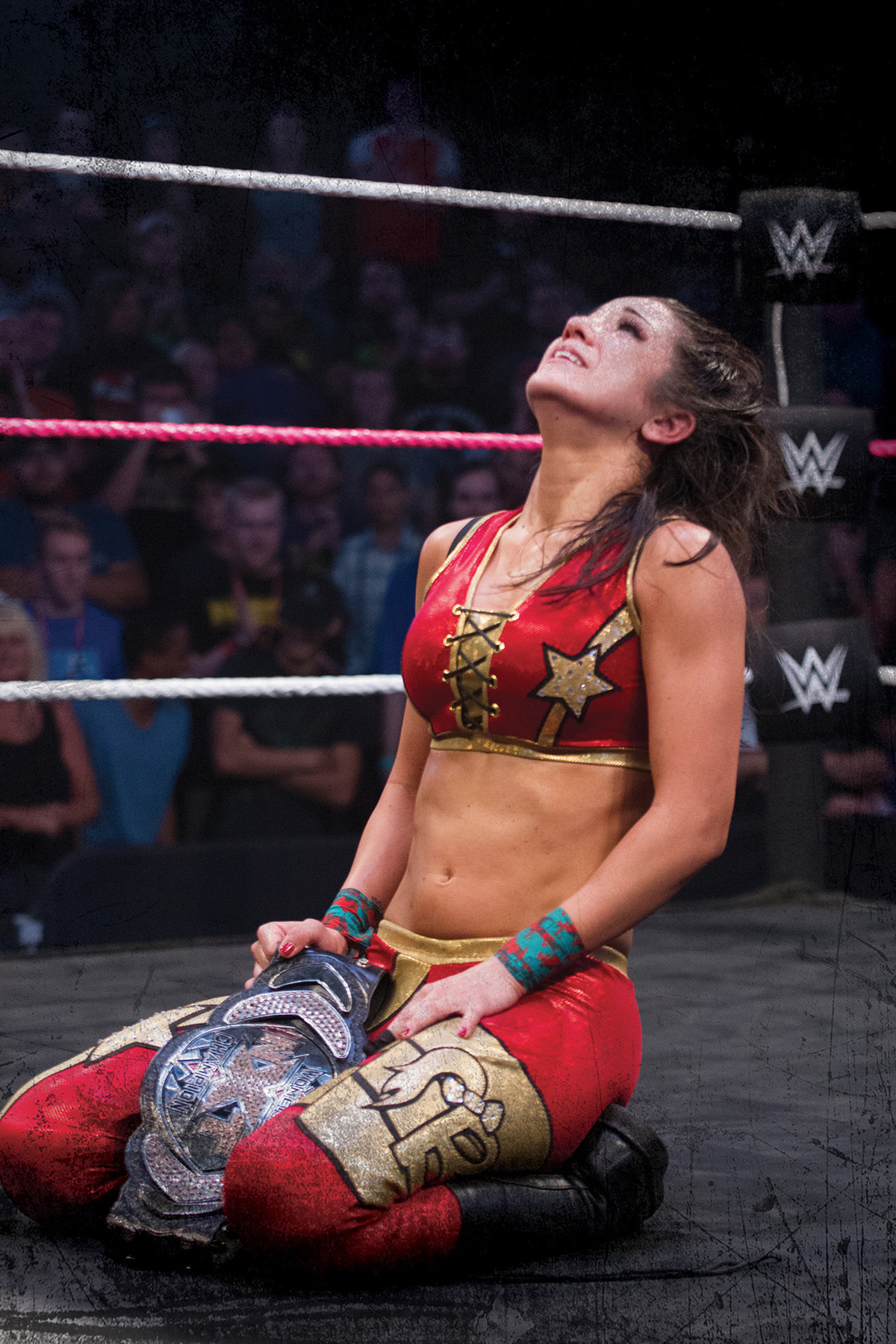CHAPTER 18
Data and Mirrors
While the first floor of the Performance Center is all business, with its seven rings and weight room, the second floor is no less important. In fact, the mirror room is where characters come to life, or go to die. Adjacent to the WWE Founding Father’s Wall, where pictures of legends like Andre the Giant and Bruno Sammartino inspire young performers, the room is set up so that a performer can walk in at any time of day, cut a promo in front of a camera, and then watch it back immediately on an iPad. Back in the day, Superstars would cut promos in front of mirrors in the locker room or in their car in order to practice before a big show, hence the old-school name for new-school technology. Once the promo has been cut and saved under their ID, performers are then able to ask for instant feedback from peers and coaches or delete the entire thing and start over if they come to the realization that it belongs on the editing room floor rather than in the spotlight of NXT.
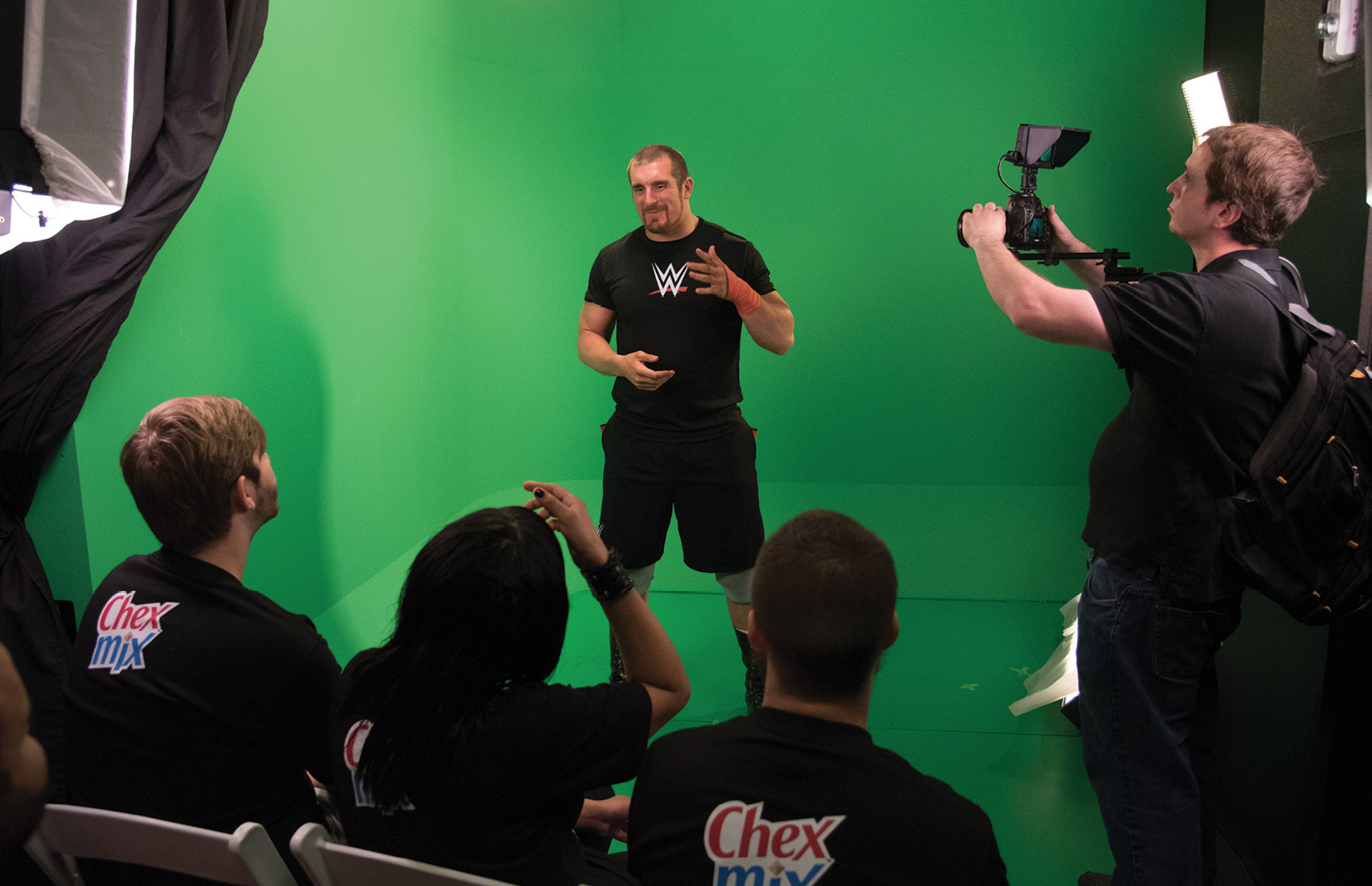
This is the room where the careers of Bray Wyatt and Tyler Breeze were revitalized, thanks to the countless hours they spent perfecting their craft. It’s also the room where talent practice their mic work before introducing the character to their peers in the more-official promo class, which separates performers into groups (women, big guys, teams, characters, smaller guys, foreign accents) to work on their speaking skills in front of a critical but honest audience of coaches and fellow development talent.
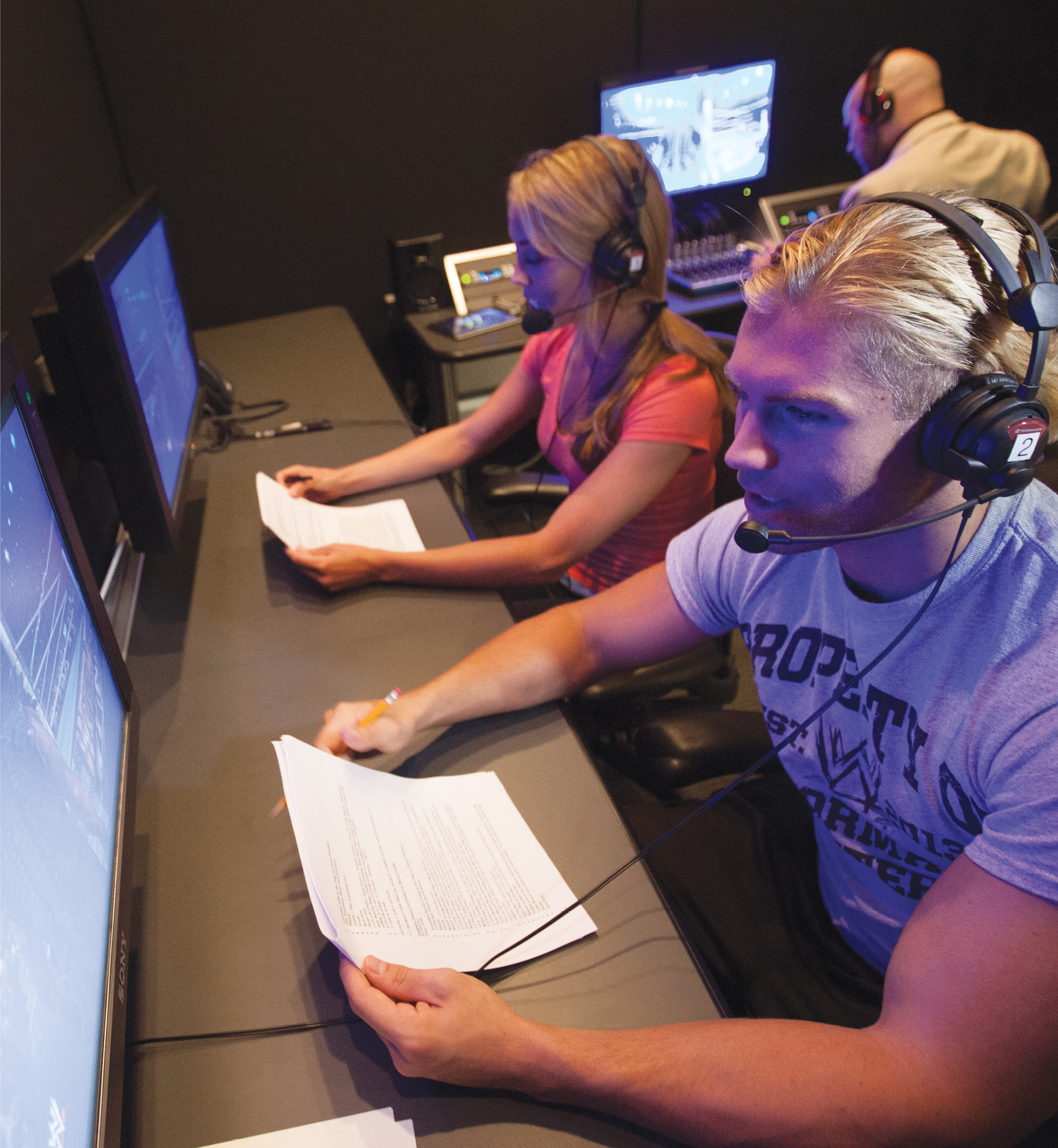
Tyler Breeze inside the mirror room.
“For us, promo class and the mirror room is where we can try things that we may not be able to try on TV,” says Crews. “You might have an idea of something you want to do, and it might sound good in front of your mirror at home, but when you get to promo class and cut it in front of your peers and coach, you’ll get an honest opinion. I might cut a promo in my house and think it’s the best thing in the world, but when I do it in front of them, it’s just mediocre. The mirror room enables you to try different things in front of a camera, then watch it back and see how it sounds. The most difficult thing is performing in front of your peers, but it’s so important to get that honest feedback. Since you’re trying to impress them, it’s a great way to come out of your shell and think outside the box. For us as performers, being able to communicate is very important. Cutting a promo is one of the keys to success in this business, so having the tools and being able to go into that mirror room as often as we want is so vital. You’re able to see your strengths, your weaknesses, and whether or not you need to approach your promo with different energy or different emotions. Not everybody is The Rock. Not everybody has those tools early on in their career. When I was wrestling in the indies, I didn’t cut a lot of promos. I didn’t get the chance to talk a lot, so one of my main focuses is getting better at cutting promos. I’m really working hard to improve my communication skills.
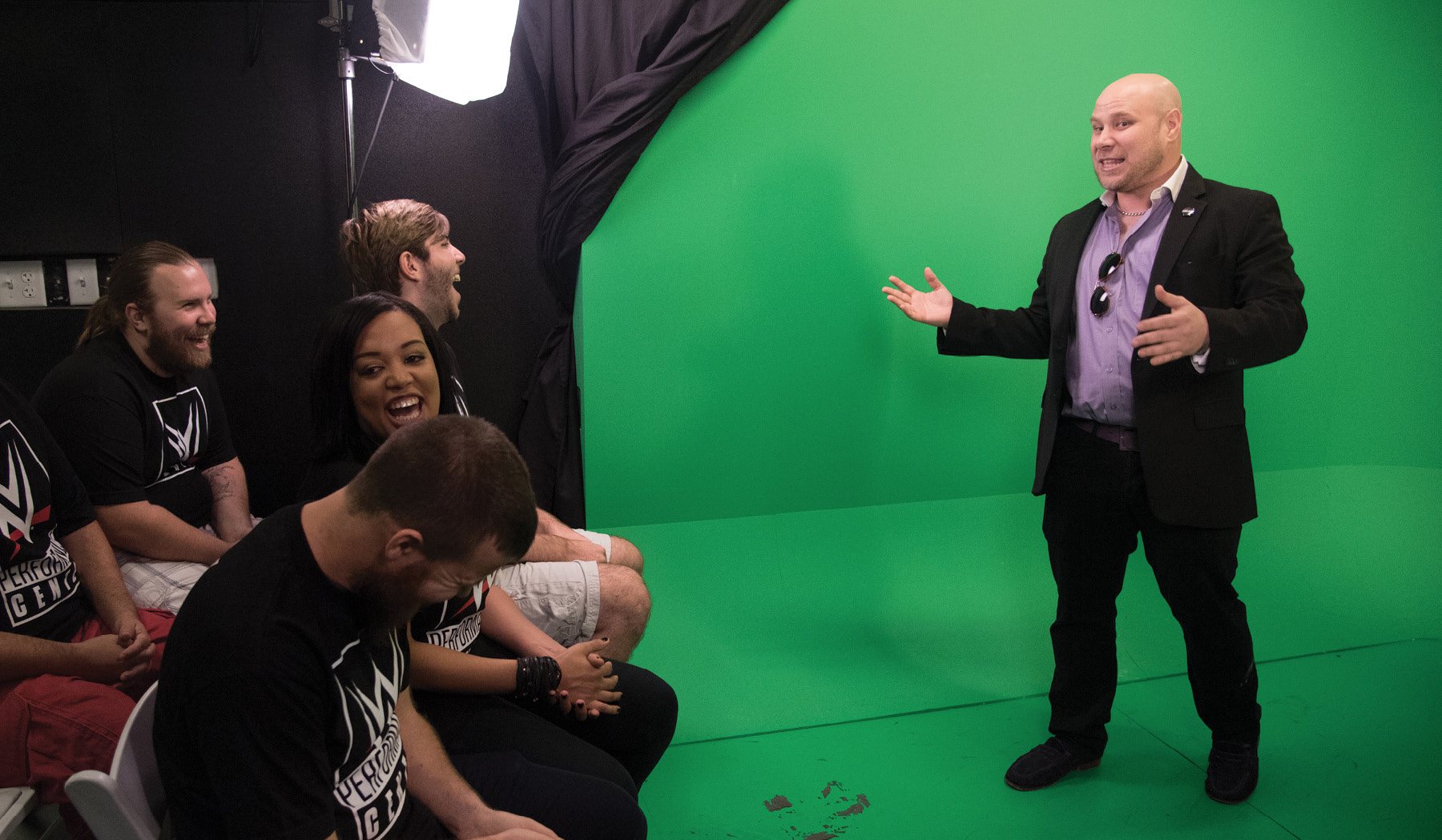
NXT Superstars get instant feedback from peers in the green-screen room.
“It’s so important to have the technology to watch your promos and your matches. When you’re in the middle of it, you think it comes off a certain way, but when you watch it back, you see exactly what you need to fix. Before the Performance Center, I rarely had the opportunity to do that, and even if I did have the opportunity to watch a match back, I couldn’t ask for feedback from someone who has years of coaching and performance experience, like we’re able to do at the Performance Center. We have all the tools for success here. If someone fails, it’s because they’re not taking advantage of all the opportunities they are being given.”
“I hated being in front of a camera. I didn’t have a character,” says Bayley, “and I had no idea what to talk about aside from how much I love WWE, and, really, everybody here loves WWE. Then I came here and Dusty Rhodes forced me to do promos. He would make me do them over and over again, and there were so many times when I’d end up in tears. I’d say, ‘I just don’t want to do this.’ I’d question whether I really wanted to be here; I just hated being in front of the camera. We’d have special classes with the people who needed the most work and, of course, I was always one of them. Dusty Rhodes pushed you and pushed you to be the best performer you could be.
“It’s embarrassing to watch, or even think about, my old stuff. There are some writers here who used to come to our promo classes and they’ll say, ‘Remember when I made you cry?’ I guess that’s what helped me. I needed that push and that tough love. Dream was amazing for that because he also inspired you and he believed in you.”
Now, Bayley sees her promo skills as one of the things that connects her to her fans. “I think they can feel the passion that I have and that I’m really just this little kid inside who’s so happy to be here. But I know I need to focus on the business, too. I need to fulfill my dreams. I have to learn how to tone down my stuff and talk to people and connect with them without breaking down and crying because I’m nervous. I just tell myself everything’s okay—that’s what Dream always told me: ‘Everything will be okay. Just tell your story.’ Dream was really good; he was the best character and promo teacher ever. Now, Ryan Katz (creative producer behind the scenes at NXT) is taking over, and he’s doing a great job and giving us new challenges.”
Sasha Banks is another performer who stepped into promo class without a word to say but has since worked to juice up her character. Now, she’s one of the best in the business.
“I was so nervous,” admits Banks. “I would freeze anytime I saw that red light go on. I think because I didn’t have a character, I didn’t know what to talk about. All I knew was that I love wrestling, but you need to have more than that. You have to have this big personality and persona, and it wasn’t until I finally found the Boss character that it clicked. Because that’s what I truly felt inside: that I was the best. Maybe I’m a little cocky, but I had to turn it up because I always got walked on. I had to wait for my opportunity and I was always very patient because there were girls who were getting their opportunities. And I would just sit there and I would wait and wait and wait. I would get so frustrated that they wouldn’t use me, and I remember just sitting in that auditorium at Full Sail and watching their matches, thinking, ‘What am I doing wrong? Why am I not on TV? How can I get myself there?’ And I really thought about what I was missing. And I realized I was missing a character. So I came up with the Boss. Now, put me in front of a camera and I’ll talk for days.”
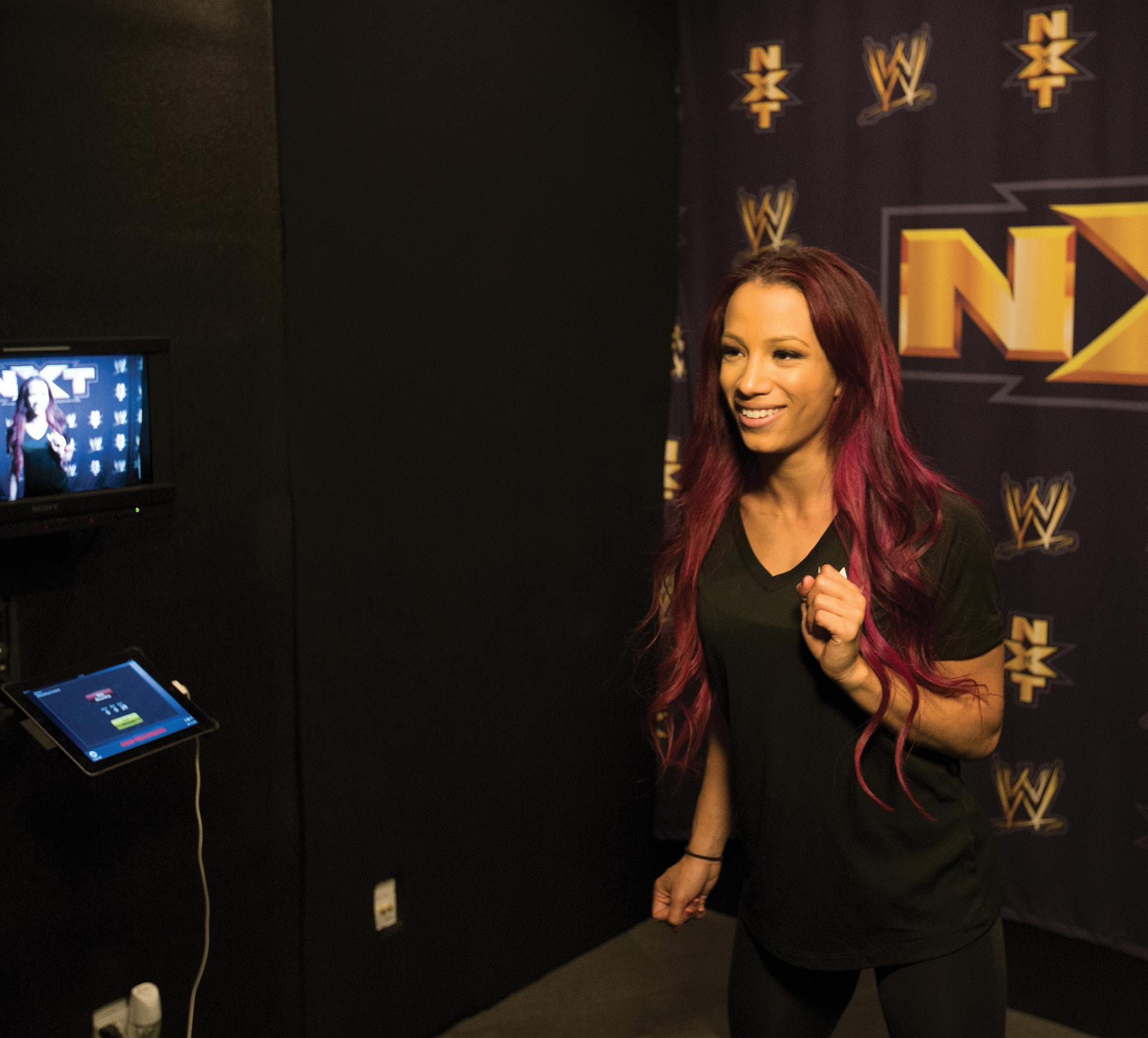
Sasha Banks puts the finishing touches on her “Boss” persona.
“With promos, the key is practicing, so you can find your voice and gain confidence,” says Neville. “From the moment you walk into the building to the moment you leave at night, that mirror room is open for you to practice your promos and watch them back immediately to review your look and sound. The promo room is a huge part of the Performance Center.”
But Charlotte admits, “I can’t watch myself; I hate watching myself. But I do find that the best promos are the ones you can personally relate to somehow. It’s not necessarily how you feel, but if you can relate what you’re saying to something you feel inside—those promos are usually the best.”

A look inside the promo room.
When it comes to watching their own performances, it’s not all about the promos. Every student inside the Performance Center has the ability to watch anything, from taped practices to matches to any pay-per-view in WWE history (when they want to study the legends). Next to the mirror room is a lounge where talent eat breakfast and lunch and huddle around giant screens that showcase the best talent in the world.
“It’s one thing to come back from a match and have someone tell you something, but it’s another thing to step into a film session and watch your match while a trainer explains what happened and shows you areas to improve,” says Big Cass. “When you watch it as an outsider, you can see what they’re talking about. Watching your matches is so important because you can get multiple coaches’ opinions at the same time. You can see what they’re talking about. You can learn things about yourself that you like or don’t like. It’s pretty cool.”
Cass also enjoys sitting in the film room and working on his announcing skills.
“You sit in the room with the TV, and you take on the role of announcer,” says Cass. “I’ve done it a couple of times. It’s great when you’re in there with someone like Byron Saxton, who knows what he’s doing. He’ll guide you along and spoon-feed you some stuff. Calling matches is so difficult. Until you’re in that room with your headset on and have completely run out of things to say, you just don’t realize how difficult announcing is. It’s a great thing about the Performance Center; they want you to learn all aspects of the business, not just what you’re doing inside the ring.”
